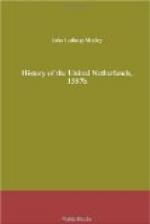And so the cause went slowly on to its thorough ending. And when “no other way” could be thought of but to take Mary’s life, and when “no other way of taking that life could be devised,” at Elizabeth’s suggestion, except by public execution, when none of the gentlemen “of the association,” nor Paulet, nor Drury—how skilfully soever their “pulses had been felt” by Elizabeth’s command—would commit assassination to serve a Queen who was capable of punishing them afterwards for the murder, the great cause came to its inevitable conclusion, and Mary Stuart was executed by command of Elizabeth Tudor. The world may continue to differ as to the necessity of the execution but it has long since pronounced a unanimous verdict as to the respective display of royal dignity by the two Queens upon that great occasion.
During this interval the Netherland matter, almost as vital to England as the execution of Mary, was comparatively neglected. It was not absolutely in abeyance, but the condition of the Queen’s mind coloured every state-affair with its tragic hues. Elizabeth, harassed, anxious, dreaming dreams, and enacting a horrible masquerade, was in the worst possible temper to be approached by the envoys. She was furious with the Netherlanders for having maltreated her favourite. She was still more furious because their war was costing so much money. Her disposition became so uncertain, her temper so ungovernable, as to drive her counsellors to their wit’s ends. Burghley confessed himself “weary of his miserable life,” and protested “that the only desire he had in the world was to be delivered from the ungrateful burthen of service, which her Majesty laid upon him so very heavily.” Walsingham wished himself “well established in Basle.” The Queen set them all together by the ears. She wrangled spitefully over the sum-totals from the Netherlands; she worried Leicester, she scolded Burghley for defending Leicester, and Leicester abused Burghley for taking part against him.
The Lord-Treasurer, overcome with “grief which pierced both his body and his heart,” battled his way—as best he could—through the throng of dangers which beset the path of England in that great crisis. It was most obvious to every statesman in the realm that this was not the time— when the gauntlet had been thrown full in the face of Philip and Sixtus and all Catholicism, by the condemnation of Mary—to leave the Netherland cause “at random,” and these outer bulwarks of her own kingdom insufficiently protected.




